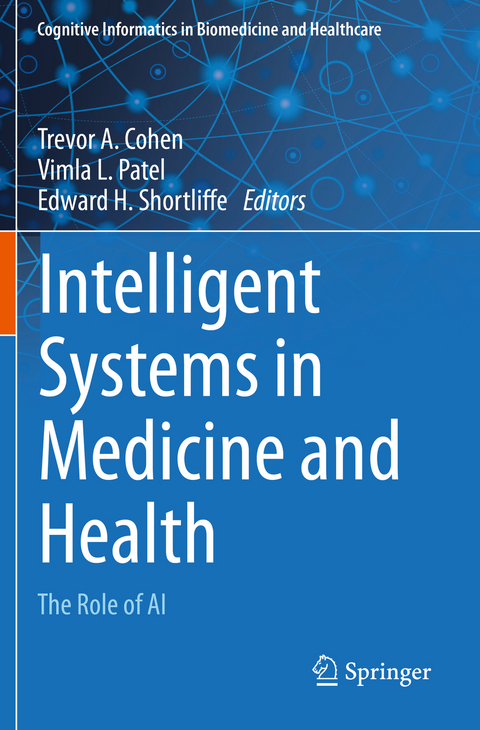
Intelligent Systems in Medicine and Health
Springer International Publishing (Verlag)
978-3-031-09110-0 (ISBN)
This textbook comprehensively covers the latest state-of-the-art methods and applications of artificial intelligence (AI) in medicine, placing these developments into a historical context. Factors that assist or hinder a particular technique to improve patient care from a cognitive informatics perspective are identified and relevant methods and clinical applications in areas including translational bioinformatics and precision medicine are discussed. This approach enables the reader to attain an accurate understanding of the strengths and limitations of these emerging technologies and how they relate to the approaches and systems that preceded them.
With topics covered including knowledge-based systems, clinical cognition, machine learning and natural language processing, Intelligent Systems in Medicine and Health: The Role of AI details a range of the latest AI tools and technologies within medicine. Suggested additional readings and review questions reinforce the key points covered and ensure readers can further develop their knowledge. This makes it an indispensable resource for all those seeking up-to-date information on the topic of AI in medicine, and one that provides a sound basis for the development of graduate and undergraduate course materials.
lt;p>Trevor A. Cohen, MBChB, PhD, FACMI is a Professor of Biomedical Informatics and Medical Education at the University of Washington in Seattle. His research focuses on the generation of distributed representations of biomedical concepts, and their application to problems in healthcare and biomedicine. Additional interests include the study and augmentation of clinical comprehension, and its role in error detection and recovery. Before joining the University of Washington, he held academic appointments at the University of Texas Health Sciences Center in Houston (2009-2018) and Arizona State University (2007-2009). Prior to this, and after training and practicing as a physician in South Africa, he completed his informatics doctoral work at Columbia University in New York, with a research focus on the development of automated methods to enhance clinical comprehension in psychiatry. He has published extensively in the areas of distributional semantics and clinical cognition, with application areas including information retrieval, pharmacovigilance, literature-based discovery, detection of linguistic indicators of psychiatric and neurodegenerative conditions, and analysis of social media. He is an elected fellow of the American College of Medical Informatics, and a member of the editorial board of the Journal of Biomedical Informatics. He is also co-editor of the Springer volume Cognitive Informatics in Health and Biomedicine (978-1-4471-5490-7)
Vimla L. Patel, Ph.D., DSc, FRSC, FACMI, is the Director and Senior Research Scientist at the Center for Cognitive Studies in Medicine and Public Health at the New York Academy of Medicine. She has adjunct professorial appointments at Columbia University, Arizona State University, and Weill Cornell Medical College. She was trained as a cognitive psychologist at McGill University in Montreal, and subsequently served there as a Professor of Medicine and Psychology and the Director of the Cognitive Science Center. She was later appointed to several biomedical informatics faculties as a Professor at Columbia (2000-2007), Professor and Chair at Arizona State University (2007-2009), and Professor at the University of Texas Health Sciences Center in Houston (2009-20011). She has expertise in using cognitive methods to capture and analyze data to model clinical decision-making and explore ways to augment human intelligence. Her recent research in cognitive informatics addresses the nature of complexity in the healthcare environment and the use of appropriate methods of investigation for health information technology intervention and patient safety. She is an elected fellow of the Royal Society of Canada (Academy of Social Sciences), the American College of Medical Informatics (ACMI), and the International Academy of Health Sciences Informatics (IAHSI). She was awarded the 2021 William W. Stead Award for Thought Leadership in Informatics. She edits the Springer book series in Cognitive Informatics in Biomedicine and Healthcare and has previously served as Associate Editor of Journal of Biomedical Informatics and Assistant Editor of Artificial Intelligence in Medicine. With a passion for mentoring graduate students, Dr. Patel has over 350 scholarly publications.Edward H. Shortliffe, MD, PhD, MACP, FACMI is Chair Emeritus & Adjunct Professor in the Department of Biomedical Informatics at Columbia University's Vagelos College of Physicians and Surgeons. He is also Adjunct Professor of Biomedical Informatics in the College of Health Solutions at Arizona State University and Adjunct Professor of Population Health Sciences (Health Informatics) at Weill Cornell Medical College. Previously he served as President and Chief Executive Officer of the American Medical Informatics Association. He has also held academic appointments at the University of Texas Health Sciences Center in Hou
Foreword.- Preface.- Section I: Introduction.- Introducing AI in Medicine.- AI in Medicine: A Historical Perspective.- Cognitive Informatics and AI in Medicine.- Data and Computation: A Contemporary Landscape.- Section II: Approaches.- Knowledge-Based Systems.- Clinical Cognition and AI in Medicine.- Machine Learning Systems.- Natural Language Processing.- Explainability in Medical AI.- Section III: Applications.- Integration of AI for Clinical Decision Support.- Predicting Clinical Outcomes.- Interpreting Medical Images.- Public Health Applications.
| Erscheinungsdatum | 13.11.2023 |
|---|---|
| Reihe/Serie | Cognitive Informatics in Biomedicine and Healthcare |
| Zusatzinfo | XXV, 598 p. 124 illus., 89 illus. in color. |
| Verlagsort | Cham |
| Sprache | englisch |
| Maße | 155 x 235 mm |
| Gewicht | 1042 g |
| Themenwelt | Informatik ► Theorie / Studium ► Künstliche Intelligenz / Robotik |
| Studium ► Querschnittsbereiche ► Prävention / Gesundheitsförderung | |
| Technik | |
| Schlagworte | AI • Artificial Intelligence • biomedical informatics • clinical decision support • Clinical Machine Learning • cognitive informatics • predictive models |
| ISBN-10 | 3-031-09110-8 / 3031091108 |
| ISBN-13 | 978-3-031-09110-0 / 9783031091100 |
| Zustand | Neuware |
| Haben Sie eine Frage zum Produkt? |
aus dem Bereich


